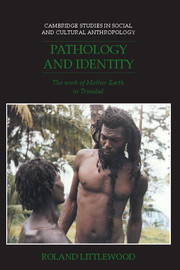Book contents
- Frontmatter
- Contents
- List of illustrations
- Preface
- Acknowledgements
- A note on idiom
- 1 The coming of the Earth People
- 2 A certain degree of instability
- 3 Madness, vice and tabanka: popular knowledge of psychopathology in Trinidad
- 4 Mother Earth and the psychiatrists
- 5 Putting Out The Life
- 6 Your ancestor is you: Africa in a new world
- 7 Nature and the millennium
- 8 Incest: the naked earth
- 9 The Beginning Of The End: everyday life in the valley
- 10 Genesis of meaning, limits of mimesis
- APPENDICES
- Glossary
- Notes
- List of references
- Index
- Cambridge Studies in Social and Cultural Anthropology
9 - The Beginning Of The End: everyday life in the valley
Published online by Cambridge University Press: 11 March 2010
- Frontmatter
- Contents
- List of illustrations
- Preface
- Acknowledgements
- A note on idiom
- 1 The coming of the Earth People
- 2 A certain degree of instability
- 3 Madness, vice and tabanka: popular knowledge of psychopathology in Trinidad
- 4 Mother Earth and the psychiatrists
- 5 Putting Out The Life
- 6 Your ancestor is you: Africa in a new world
- 7 Nature and the millennium
- 8 Incest: the naked earth
- 9 The Beginning Of The End: everyday life in the valley
- 10 Genesis of meaning, limits of mimesis
- APPENDICES
- Glossary
- Notes
- List of references
- Index
- Cambridge Studies in Social and Cultural Anthropology
Summary
Freeing Up the Nation
Mother Earth's visions cannot be considered simply as idiosyncratic explanations of personal experience, for many young people have left their homes and families to join her in a desolate part of the Trinidad bush. In contrast to Blake or Shelley whose ideas I have compared with hers, her visions have been realised in a social group: they may be said to ‘work’ – in both our conventional senses. Like Ann Lee and Gerard Winstanley with whom too I have argued many affinities, she not only awaits the return to the original Life of Nature, but is actively organising a community to prepare for The Beginning Of The End.
Do the experiences and beliefs of each new member replicate those of Mother Earth – generating, in some sort of mimesis, a homologous structure of social organisation and values – or does each member relate reciprocally (by complement) to her? As we shall see, both. We find homology in those aspects which evoke the historical and political situation shared by all Black people as against the Whites, for the whole membership is Black; and reciprocity in those aspects which articulate the relations between Black mothers and their children, and between women and men, for the majority of the permanent members are young men.
Against a purely biographical reading of Mother Earth we can place a ‘fable’ published by a Trinidadian student in the United States. This tells how the Creatrix produced an harmonious world inhabited by Black people, an androgynous race ruled by The Mother of the Nation. ‘Bearing the pregnant vitalisms of the maternal source', these first humans are music loving and pacific, agriculturalists who revere the ancient cycles of the Earth.
- Type
- Chapter
- Information
- Pathology and IdentityThe Work of Mother Earth in Trinidad, pp. 174 - 215Publisher: Cambridge University PressPrint publication year: 1993

